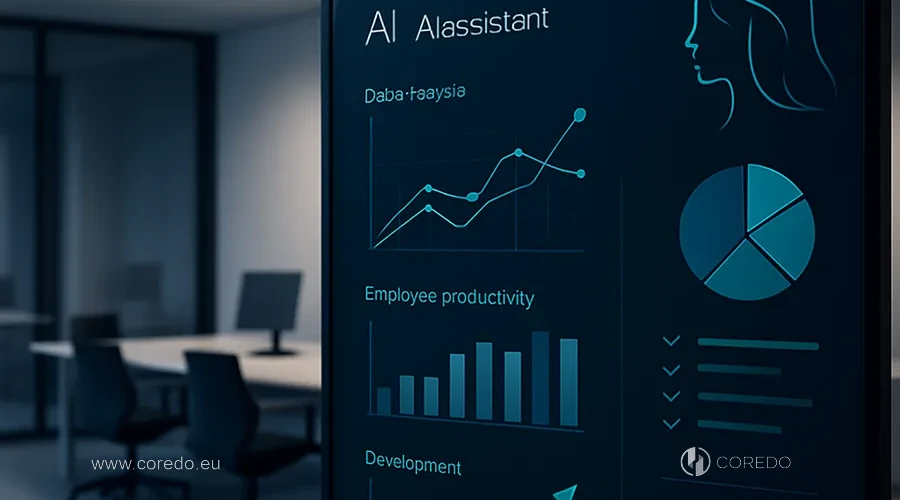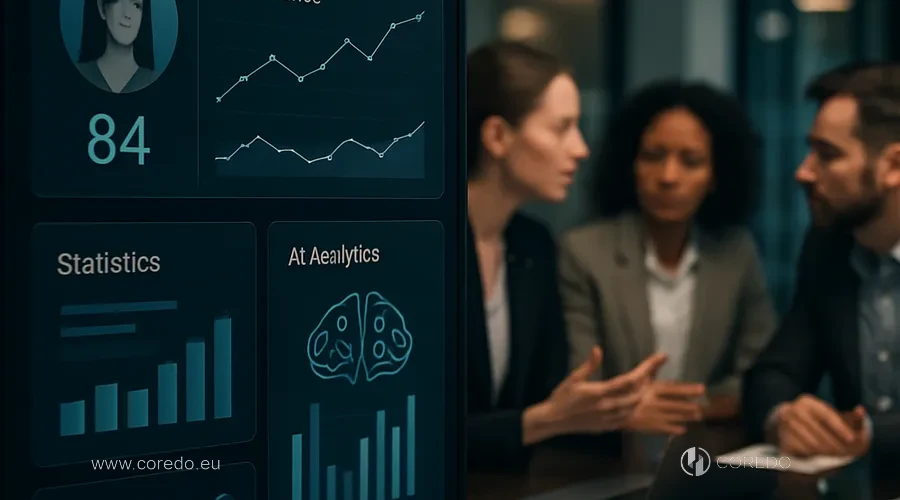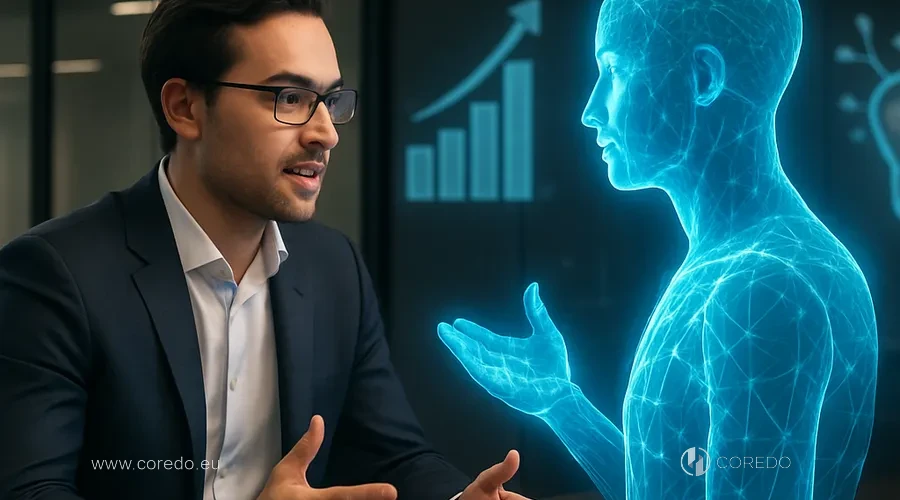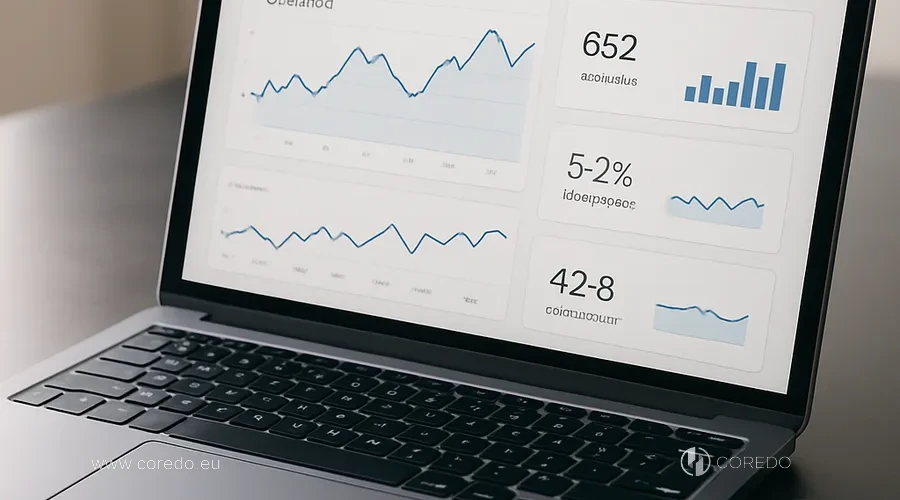By 2025, nearly 80% of international companies in Europe and Asia already use elements of artificial intelligence in human resource management, and every third organization integrates AI into key HR processes.
In practice, the COREDO team has repeatedly encountered that implementing artificial intelligence in HR requires not only technological investments but also a systemic transformation of approaches to staff development, performance evaluation and the formation of corporate culture.
If you are looking for practical guidance and strategic ideas for developing employees in the age of computer technologies, I recommend reading to the end. Here you will find not only the latest trends but also proven solutions that the COREDO team has implemented for clients in different jurisdictions.
Employee AI Development for Business

In 2025, employee AI development became a key driver of competitiveness for companies operating in Europe, Asia and the CIS. According to a Gartner study, over 70% of international organizations already use artificial intelligence in HR to automate routine tasks, increase productivity and digitize HR processes.
Trends shaping AI development in HR:
- HR automation: AI takes on recruitment, resume screening, competency assessment and even conducting initial interviews.
- Digitization of HR processes: Implementing digital HR platforms with AI analytics enables companies to respond quickly to labor market changes, manage talent and build personalized career trajectories.
- Next-level HR analytics: Neural networks and machine learning analyze employee Big Data, identify hidden patterns, and predict risks of burnout and turnover.
AI technologies in HR: machine learning and generative AI
Over the past two years, machine learning and large language models (LLMs) have played a key role in HR transformation. These technologies make it possible to automate competency assessment, reveal employee potential and form optimal teams.
Corporate training with AI reaches a new level thanks to generative artificial intelligence. The solution developed by COREDO for one of its clients in Singapore included the implementation of AI-mentorship: virtual assistants analyzed training results, suggested individual development trajectories and responded instantly to employees’ questions.
Chatbots and virtual assistants in digital HR platforms provide round-the-clock employee support, automate responses to standard requests and help onboard new team members. This approach is especially effective for international companies with distributed offices.
Gamification in training and digital AI-powered employee development tools make the upskilling process interactive and motivating, as evidenced by rising employee satisfaction indices.
HR automation with AI in personnel management
Automating HR processes with AI allows significant acceleration of recruitment and employee assessment. For example, COREDO’s practice showed that implementing AI solutions to automate recruitment in a European fintech company reduced time-to-hire by 40%, and the quality of candidates improved due to objective competency assessments.
Digital HR platforms with AI provide talent management at all stages: from hiring to building individual career trajectories. Personalization of the employee experience becomes the standard: AI analyzes data on performance, training and engagement, offering personalized recommendations.
AI for productivity improvement: In one of COREDO’s cases in the Czech Republic, implementing AI analytics made it possible to identify hidden causes of productivity decline and propose solutions to prevent burnout (burnout prevention). Employee satisfaction indices rose by 15% in the first quarter after implementation.
Implementing AI in employee development and HR

Implementing artificial intelligence in employees’ work requires a systematic approach and phased implementation. COREDO’s experience shows: success depends not only on the choice of technologies but also on the company’s readiness for change.
Key stages of AI implementation:
- Business process analysis and goal setting: It is important to clearly understand which HR tasks should be automated and which performance metrics will be used.
- Selection and integration of AI tools: At this stage the COREDO team helps to select optimal digital HR platforms, taking into account the specifics of the jurisdiction and industry.
- Training employees in AI competencies: Without developing new skills among staff, even the most advanced solutions will not yield the desired effect.
- Piloting and scaling: Launching pilot projects makes it possible to minimize risks and adapt AI solutions to the real needs of the business.
- ROI assessment and continuous optimization: It is important to regularly analyze performance metrics and adjust the strategy.
Best practices for using AI in HR processes include:
- Building AI-solution pipelinestaking into account GDPR and AML compliance.
- Implementation of HR analytics to assess employee performance and manage talent.
- Use of digital tools for corporate training with AI and gamification.
Thus, a systematic approach and proper organization of implementation stages make it possible to fully unlock the potential of AI in HR. Next, we will look at how modern AI tools help increase the objectivity and effectiveness of employee evaluation.
Evaluating employee performance with AI
AI tools enable objective assessment of employee productivity and competencies using comprehensive KPIs and HR analytics.
Key metrics:
- Employee satisfaction indices (Employee Satisfaction Index)
- Engagement and turnover indicators
- Speed of onboarding for new employees
- ROI from AI investments in HR
- Employee performance metrics (Performance Metrics)
In COREDO practice, digital tools integrated with corporate HR platforms are used to assess staff effectiveness. For example, AI analytics makes it possible to identify areas for development, predict career trajectories and offer individual training plans.
Managing remote teams with AI
AI is becoming an indispensable tool for managing remote and hybrid teams. Implementing digital HR platforms with AI analytics allows tracking productivity, engagement and preventing burnout among employees working outside the office.
Solutions developed at COREDO include:
- Using AI to monitor productivity and automate feedback
- Implementing corporate training with AI to develop skills in distributed teams
- Applying AI analytics to identify risks of burnout and decreased motivation
COREDO’s practice shows: implementing multi-level control systems and regular audits of AI solutions helps minimize these risks.
The impact of AI on corporate culture and talent development

AI not only optimizes processes but also changes corporate culture, increasing engagement and openness to innovation. A new culture of collaboration between people and algorithms is forming in international companies in Europe and Asia.
The role of AI in shaping corporate culture:
- Increasing transparency of decision-making
- Personalization of career trajectories and talent development using AI
- Introducing AI competencies as a mandatory element of corporate training
New jobs and competencies: With the increased adoption of AI in HR, new roles are emerging — prompt engineers, AI trainers, specialists in HR analytics and digital platforms. COREDO’s solution for a client in the UK included the development of a training program for employees to work with generative AI and large language models.
Thus, AI is becoming a key driver of change and opens new opportunities for corporate training, which we will examine in detail in the next section.
Corporate training with AI: tools and practice
Modern digital tools for employee training with AI include gamification, virtual mentors and chatbots integrated into HR platforms. This approach provides personalization of learning and accelerates the development of required competencies.
Best practices for integrating AI mentoring:
- Using chatbots for onboarding new employees and providing 24/7 support
- Implementing digital learning platforms with gamification elements and individual feedback
- Analyzing training effectiveness using AI analytics and adjusting development programs
Recommendations and conclusions for entrepreneurs and leaders

How to start implementing AI for employee development in an international company:
- Audit current HR processes and identify areas for automation
- Define key performance metrics and objectives for AI implementation
- Choose reliable digital HR platforms with AI functionality, taking into account local legal requirements
- Organize employee training on AI competencies
- Launch pilot projects and scale successful solutions
How to minimize risks and increase ROI from AI investments in HR:
- Implement multi-level control systems and regular audits of AI solutions
- Ensure algorithmic transparency and protection of employee data
- Use HR analytics for continuous process optimization
Recommendations for choosing AI tools and building an AI strategy:
- Focus on solutions that support integration with existing business processes
- Consider industry specifics and jurisdiction
- Implement digital tools for employee training and development with AI
Checklist for successful digital HR transformation:
- HR process audit
- Defining goals and metrics
- Selecting AI platforms
- Employee training
- Launching pilot projects
- Evaluating ROI and scaling
Article conclusion for SEO

The development of AI employees in the era of computer technologies: it’s not just the implementation of new tools, but a comprehensive transformation of approaches to personnel management, corporate training and talent development. COREDO’s international experience confirms: companies investing in the digitization of HR p
Processes and the development of AI competencies gain a sustainable competitive advantage in the global market.
In conditions of rapid change and increasing demands for business flexibility, only a systematic approach and continuous employee training in working with AI make it possible not just to adapt, but to outperform competitors. Digital transformation of HR is the key to long-term success and the development of your business in Europe, Asia and the CIS.
If you are ready to take the next step toward developing employees’ AI capabilities and building an effective HR strategy, the COREDO team is always ready to share expertise and practical solutions for your business.